
Enhancing operational efficiency with air bellows
In power generation facilities, maintaining operational efficiency is crucial. Air bellows provide vibration isolation, shock absorption, and precision load support. These components ensure machinery stability, reduce equipment wear, and improve energy efficiency. Their ability to function in harsh environments makes them indispensable for power plant applications.
Technical specifications: Standard air bellows operate at 8 bar pressure, with reinforced four-ply options handling up to 12 bar. The operating temperature range varies from -40°C to +115°C, depending on the rubber compound. Standard diameters range from 80 mm to 950 mm, supporting loads up to 450 kN. The stroke length varies between 60 mm and 375 mm, ensuring optimal shock absorption. The natural frequency ranges from 1.2 Hz to 4.6 Hz, offering excellent vibration isolation capabilities. Mounting options include threaded bead rings and flange plate connections, allowing for seamless integration.

The role of air bellows in power plants
Vibration control and noise reduction
High-performance equipment in power plants generates substantial vibrations that degrade performance. Air bellows effectively dampen vibrations and prevent structural damage, thereby prolonging the lifespan of critical components. Additionally, they contribute to noise reduction, enhancing workplace safety.
Technical specifications: The natural frequency of air bellows ranges from 1.2 Hz to 4.6 Hz, depending on size and load. This ensures over 99% vibration isolation, improving machinery longevity and stability. The use of galvanized steel or stainless steel (AISI-304) for mounting components provides corrosion resistance, extending service life. Flexible mounting options, including flange plates and bead rings, ensure secure attachment. Standard pressure ratings reach 8 bar, with four-ply reinforced models capable of withstanding 12 bar. The expected operational lifespan exceeds one million cycles, depending on operating conditions.
Load balancing and motion compensation
Power plant machinery often experiences dynamic loads that require precise load balancing. Air bellows provide uniform pressure distribution, compensating for misalignments and maintaining operational stability. Their ability to absorb shock loads ensures continuous operation without excessive stress on components.
Technical specifications: Maximum stroke lengths range from 60 mm to 375 mm, depending on bellow type. Load capacities vary, with single convolution models handling up to 70 kN, and triple convolution models reaching 400 kN. Customizable bead ring and crimped designs allow for secure attachment. The height control system ensures consistent load distribution, reducing mechanical fatigue. The low natural frequency improves machine stability, minimizing operational noise. The temperature resistance varies depending on the rubber compound, ensuring suitability for various industrial applications.
Thermal expansion management
Temperature fluctuations in power plants cause thermal expansion in machinery. Air bellows accommodate dimensional changes, reducing strain on piping systems and ensuring consistent alignment. This capability minimizes the risk of mechanical failures caused by thermal stresses.
Technical specifications: The temperature resistance of chlorobutyl compounds reaches 115°C, while natural rubber variants function at -40°C to +70°C. Flexible mounting options, including threaded bead rings or flange plate connections, allow for seamless integration into various systems. Load handling capacities range from 70 kN to 400 kN, depending on the bellow configuration. Height-adjustable features ensure optimum performance in dynamic thermal conditions. The reinforced elastomer construction improves durability, extending service life.
Key benefits of using air bellows
Extended equipment lifespan
By absorbing mechanical shocks and reducing vibrations, air bellows significantly extend the life cycle of power plant equipment. They prevent premature wear and reduce the need for frequent maintenance.
Technical specifications: The expected service life of high-quality air bellows exceeds one million cycles, depending on operating conditions. The reinforced fabric layers enhance durability, while stainless steel end fittings improve resistance to environmental factors. The self-lubricating rubber compounds prevent deterioration, ensuring consistent pressure control. The corrosion-resistant coatings further enhance long-term reliability, making them ideal for demanding applications. Their compact design enables easy installation, reducing the risk of component failure.
Optimizing power plant efficiency with air bellows
Air bellows play a vital role in power plant operations, providing vibration control, shock absorption, and thermal compensation. Their durability, low maintenance requirements, and customizability make them essential for optimizing industrial efficiency.
